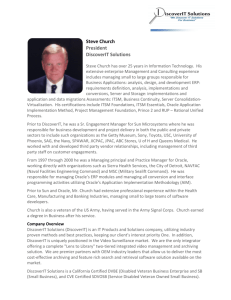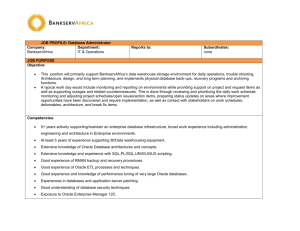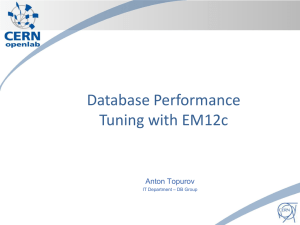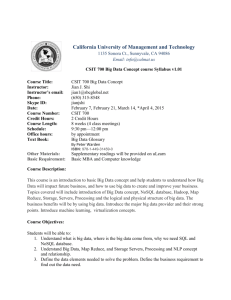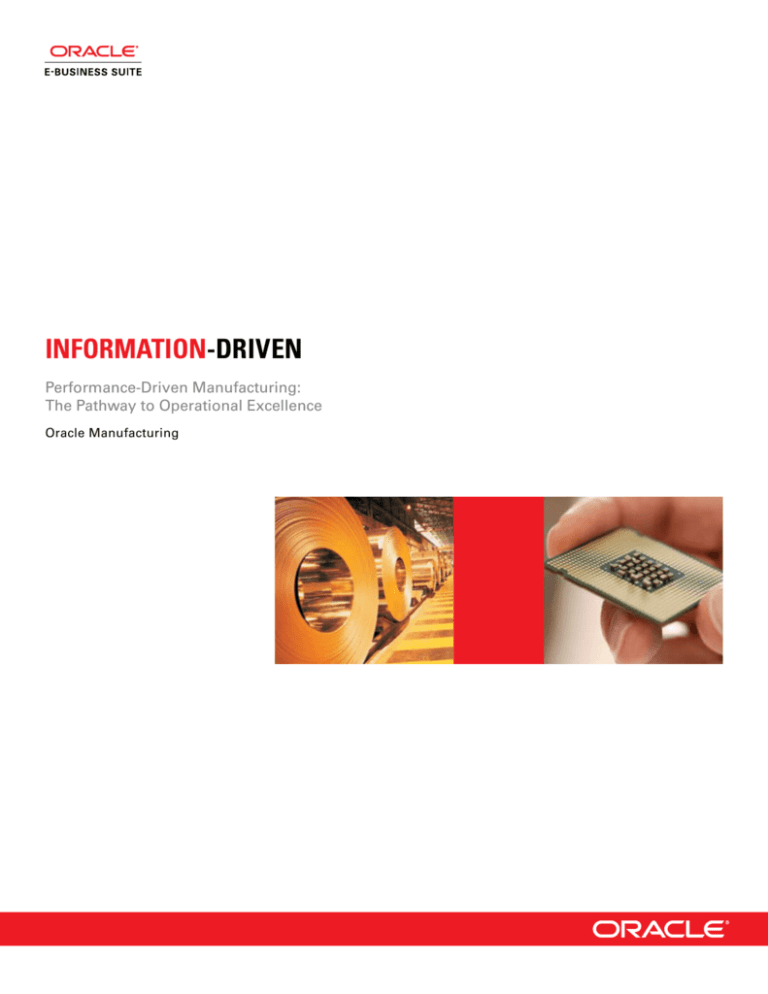
INFORMATION-DRIVEN
Performance-Driven Manufacturing:
The Pathway to Operational Excellence
Oracle Manufacturing
Performance-Driven
Manufacturing
The efficiency to fulfill the intended purpose. A focus
on success. Making goods for a global economy. That’s
performance-driven manufacturing. And it’s the type
of solution that manufacturers around the world expect
from Oracle.
In a global economy that is unprecedented in its connectedness, so much depends
on how your business adapts. Getting more from your operations—and spending
less—can make the difference between profit or loss. Everything matters.
Around the globe, manufacturers are searching for new, creative ways to address
the growing demands of global manufacturing. They want the latest tools and
technologies to boost performance from their operations, suppliers, partners,
distributors, and extended ecosystem, and they need global views for better visibility—
both internally and across the extended supply chain. In addition, operations must
move information more effectively to gain real-time insight into manufacturing
shop floor status.
Whether it’s inside the plant or outside the traditional factory walls, manufacturers
are searching for solutions to help them produce more for less, lower their total cost
of ownership (TCO), and improve their return on investment (ROI). With the latest
release of Oracle E-Business Suite, Oracle delivers preintegrated manufacturing
applications that provide solutions for today and anticipate the needs of tomorrow.
Goods manufactured efficiently and engineered to succeed in a global economy—
that’s performance-driven manufacturing from Oracle.
1
Fact: Nine of the top ten
global manufacturing giants
run Oracle Applications.
Streamline Global Capabilities
Integrate and Automate Key
Manufacturing Processes
Oracle Manufacturing applications
include the following components:
•
Oracle Production Scheduling
•
Oracle Discrete Manufacturing
•
Oracle Process Manufacturing
•
Oracle Manufacturing
execution systems
•
Oracle Flow Manufacturing
•
Oracle Manufacturing
Operations Center
•
Oracle Shop Floor Management
•
Oracle Asset Lifecycle Management
•
Oracle Enterprise
Things change—that’s a given—but successful companies know how to assess the risks, options,
and alternatives, and then take advantage of the latest tools and technologies to run their
plants more efficiently and respond quickly to change.
Set Higher Standards for Collaboration and Information Exchange
With supply lines extending globally and plants repositioning to new markets, manufacturers need better ways to capture and manage critical supply information at the point of origin.
From inventory replacement to point-of-sale (POS), and from planning and manufacturing
operations to information transfer and collaboration in near real time, critical connection
points tie everything together in a demand–pull process that ripples across the enterprise.
Companies that know how to collaborate with their customers and suppliers in this
environment have an edge in the race to market, and with the Oracle E-Business Suite
family of manufacturing applications, businesses can have the competitive advantage they
seek. With Oracle Manufacturing
•
Asset Management
•
Line supervisors and managers have visibility into the same big picture. Real-time access
to a single, comprehensive set of data provides insight into global production operations
across an extended, multienterprise supply chain.
Operational planners can determine best-cost and best-delivery options based on current
supply and production status. Quick detection and collaborative resolution of potential
problems happen at all locations and all tiers of the supply chain.
Gain Visibility and Improve Responsiveness
Historically, companies have implemented a number of plant-specific manufacturing execution
systems (MES) and processes to manage the shop floor. Unfortunately, these systems often
result in stacked silos of information, providing little understanding of an organization’s
overall performance.
2
“Of all the Tier 1 solution providers, we believe Oracle has the best manufacturing
solution for us. Our manufacturing process is already Lean and cutting‑edge, so
we were looking for software that would support our existing Lean processes and
help us gain needed visibility across our entire enterprise.”
Brian Waldrop, Executive Vice President and CFO, Viking Appliances
The success of Lean strategies in manufacturing organizations has resulted in a shift in focus
that makes manufacturing processes more flexible, responsive, and competitive. With this
improved responsiveness, Lean organizations can quickly adapt to the increasingly complex
demands of global manufacturing—demands that require more connectivity and more-effective
communication among suppliers, shop floor systems, and back-office enterprise resource
planning (ERP). By linking to a Lean, demand-driven supply chain, companies can deliver
quality, flexibility, and efficiency.
For example, Oracle Manufacturing Operations Center gathers raw data from shop floor
equipment and—using information from ERP and other MES applications—combines this
data with reports and prebuilt plant performance dashboards to give plant managers access
to useful, real-time, shop floor information.
“Project Unibiz linked the
entire supply chain—from
procurement to sales. It gave
us enterprisewide visibility
into information anywhere,
any time, improving crossfunctional knowledge across
the organization.”
Arup Choudhury
CIO
Eveready Industries India, Ltd.
Capitalize on New Opportunities
With the expansion of global markets, performance-driven manufacturers must be able to
respond to shifting regional markets by offering new, localized products with customized
features, preferences, and user-selected options. In addition, with rising logistical costs, it
is often more cost-effective to construct and assemble large products locally. The Oracle
E-Business Suite family of manufacturing applications helps businesses of all sizes take
advantage of global opportunities and make better-informed decisions about the best use
of critical resources.
For example, Oracle Strategic Network Optimization helps planners make decisions about
sourcing materials across the supply chain and using valuable resources most effectively. Given
the different profit margins for various products and the constraints (such as customer contracts)
for specific products, planners can calculate the best combination of products and then
identify where adjustments need to be made to balance long-term demand with supply.
An aluminum producer, for example, might use Oracle Strategic Network Optimization
to determine the most profitable mix of products to produce on a shared resource, such as
a rolling mill.
“The technical solutions of
Oracle E-Business Suite
have allowed us to achieve
synergy among the different
production plants, which
optimizes the company’s
operational efficiency and
helps us maintain our
market leadership.”
Gustavo Adolfo Renthel
Business Analyst
Dana Corporation
3
“Oracle Enterprise Asset Management enabled us to eliminate data duplication,
improve facilities management, and gain better inventory control. We expect to
save more than US$22.3 million over five years as a result of implementing the
Oracle solution.”
Lee In-bong, CIO, POSCO Steel
Drive Operational Excellence
“It’s about value-chain linkage,
acquisition integration, and
lower operating costs....
We chose Oracle for cost,
functionality, overall reliability,
value-chain linkage, and the
e-business functionality that
Oracle was developing.”
Kevin Homer
North America CIO
Alcoa Inc.
“First-year benefits are
attributable to Lean, but
every year after—from Y+1
to infinity—is attributable
to the [Oracle] system by
enforcing and maintaining
the Lean processes.”
Mike Macrie
Global Director
Back Office Applications
Thermo King/Ingersoll Rand
4
In today’s manufacturing climate, customers are demanding products tailored to their unique
specifications. This larger role of customers in product decisions means that manufacturers
need advanced tools to improve their product-line planning. They must be able to balance
resources and features, and then make any adjustments for customized or complex orders.
Oracle offers a complete stack of manufacturing applications, fully integrated with Oracle
industry solutions and based on an open architecture, that lets you use them with products
already deployed.
Introduce Innovation into Operations
To drive down product costs, deliver at specified levels of quality, meet schedule commitments,
and be competitive, manufacturing operations must effectively manage and communicate
product information to suppliers in the global supply chain. In addition, capital equipment
manufacturers must provide superior customer service throughout the product lifecycle,
and process manufacturers need computer-aided formulation and recipe capabilities to keep
products within specific tolerances during production.
Products Designed for the Specific Needs of Your Business
No matter which manufacturing method you deploy, Oracle has products designed to meet
your industry’s specific requirements. Oracle’s preintegrated manufacturing applications
maximize operating efficiency and flexibility by supporting a variety of methods—including
engineer-to-order, configure-to-order, and make-to-stock—along with Oracle’s discrete, process,
flow, mixed-mode, and lot-based solutions. Manufacturers can also track a variety of business
processes in different plants or locations without needing additional solutions.
Solutions for the Life of Your Products
With a primary focus on time-to-value, Oracle’s Agile product lifecycle management
applications help accelerate revenue, reduce costs, improve quality, and ensure compliance,
to drive innovation throughout the product lifecycle. This broad suite of best-practice product
lifecycle management solutions provides secure, timely, and accurate visibility and control of
critical product record information. They help you track and manage all information required
by the enterprise—and its extended design, supply, and value chain—to conceptualize, design,
source, build, sell, service, and properly dispose of products.
Improve Plant Flexibility and Responsiveness
Support for Process
The larger role of customers in configured product decisions requires companies to improve
their product-line planning so they can balance resources and features and then make
adjustments based on incoming orders. Successful companies can provide customized versions
of products—at any volume—and ship them to, or from, anywhere in the world.
Manufacturing Industries
Oracle Manufacturing Execution System for Process Manufacturing and Oracle Manufacturing
Execution System for Discrete Manufacturing provide “deeper” shop floor execution capabilities so that both discrete and process manufacturers can deploy Oracle Applications as the
platform for their shop floor—completely removing the need for a third-party (or in-house)
MES system. With Oracle’s applications for MES, manufacturing firms can reduce costs and
eliminate integration headaches and support issues. Shop floor operators and supervisors can
effectively identify and eliminate nonvalue-added activities while efficiently managing,
recording, and monitoring shop floor activities in real time.
Process manufacturers using
commodities or relying on the
blending of ingredients as the
basis for their products must
consider the variable characteristics
and costs found in their raw
materials to produce consistent,
high-quality products.
New least-cost-formulation
capabilities in the latest release
of Oracle E-Business Suite
optimize material use and cost,
Performance-Driven Scheduling
generate a formulation from a list
To compete effectively, firms must optimize their use of critical resources, calculate realistic
and feasible schedules, and quickly determine the schedules that best meet corporate objectives.
Oracle Production Scheduling gives manufacturers tools to create detailed, up-to-the-minute
schedules that produce the right amount of product and minimize inventory, changeovers,
overtime, and other undesirable costs. Oracle Production Scheduling—designed for schedulers
by schedulers—provides local control of production scheduling situations so plant managers
can maximize shop floor throughput while optimizing their resource investment.
of alternative materials (based on
Control Product Costs with Lean Operations
total value optimized.
a true optimization of costs), and
then find the best components based
on the attributes of the materials
and the constraints defined by the
customer. Implementing least-cost
formulations can save companies
an annual 2 to 10 percent of the
With today’s tight margins, firms are using new Lean manufacturing techniques to reduce
product cycle times, minimize inventories, simplify production, and improve product quality.
Running Lean helps companies drive costs down while responding quickly to changing
customer needs. Oracle Flow Manufacturing supports demand-driven flow and the latest
Lean techniques by building to customer demand, line balancing, scheduling, and sequencing to improve efficiencies, and planning for and executing Kanban systems.
5
Achieve Quality and Compliance
Oracle Support for Compliance
Oracle Manufacturing applications
help manufacturing firms comply
with regulatory requirements and
industry initiatives, including
•
21 Code of Federal Regulations
(CFR) Part 11
•
21 CFR Part 280
•
Restriction of the use of certain
hazardous substances in electrical
and electronic equipment (RoHS)
•
Process analytical technology (PAT)
initiative of the U.S. Food and Drug
Administration (FDA)
Manufacturing firms today are being driven to higher and higher standards of compliance
and governance. With the evening news reporting recalls on a regular basis and contaminants
periodically entering the bill of materials, regulatory compliance has become one of the most
critical requirements for today’s manufacturers.
As companies outsource products to offshore and onshore locations, having the ability to
track raw materials, adverse compounds, ingredients, and possible toxins is essential to
responsible organizations. Unfortunately, some of the manufacturing systems currently in
use by the manufacturing community are unable to meet these requirements. Fortunately,
Oracle’s manufacturing applications can.
Tracking for Compliance
Through a series of data collection and workflow functionality, Oracle Manufacturing automates
the collection of tracking for bills of material (BOM) data and then converts that data into
manageable information. Regulated industries are required by law to provide key information
about the genealogy of their products. In the event of a recall, information that pinpoints
the source and potential scope of exposure is critical to minimize safety and financial risk.
Oracle provides these crucial genealogy-analysis tools so you can rapidly respond to requests
for needed information. As a result, manufacturing firms can more easily monitor compliance
requirements and reduce their risk of exposure.
Ensuring Corporate and Government Mandates
Manufacturing firms need transparency, clarity in direction, and the right system to
properly record costs against process. Oracle Cost Management is a comprehensive solution
that helps organizations project production costs and perform cost accounting for supply
chain transactions. These activities are key for complying with regulatory reporting and
accounting requirements, for streamlining the use of working capital in organizations, and
ultimately, for improving profitability.
6
“This system shortens the production lead time and changes the manufacturing
cycle system from the previous monthly units to weekly units.... Placing Oracle
Advanced Supply Chain Planning as the system core module, we will adopt
the worldwide “one number” forecasting concept, and optimize the consistent
worldwide inventory from manufacturing to sales through logistics.”
Toshiba TEC Corporation
Initiate Continuous Process Improvement for Compliance
Oracle Manufacturing applications help businesses comply with regulatory requirements and
government and industry initiatives.
•
•
•
Oracle Process Manufacturing simplifies compliance with FDA 21 CFR Part 11 by leveraging
Oracle’s integrated technology platform of database, application server, and application
systems components, through the support of electronic record electronic sign (ERES) events
“Moving to a demand-driven
manufacturing environment
is not merely a good idea
in developing a progressive
business strategy, it’s a
requirement for companies
looking to gain and sustain a
Oracle Inventory precisely tracks variability with a quality-based view of raw materials and
products, and then incorporates customer-specific attributes, grades, and shelf life into the
definition of an item lot
competitive advantage in the
Oracle Daily Business Intelligence for manufacturing provides manager-enhanced visibility
into operations, maximizing manufacturing performance and providing tools to identify
potential issues before they have a chance to escalate
Arnie Kennedy
President and CEO
APICS
volatile landscape of today’s
manufacturing environment.”
Closed-Loop Quality Management Throughout the Supply Chain
Performance-driven manufacturing means that firms have adopted evolving workflow processes
and application tools to standardize and drive down variability, while still allowing processes
to evolve with quality practices. Successful firms are looking for efficient ways to control
manufacturing and supply chain operations by regulating work packages to meet market
demands more effectively.
Excess materials, overbuilds, and shrinkage can all be regulated with the adoption of Oracle
Manufacturing applications that better match build quantities with forecasted volumes. For
example, Oracle Quality is a flexible quality-management system that performs quality data
collection at different points across the enterprise and throughout the supply chain. Oracle
Quality works as a closed-loop process that ensures compliance, enables proactive quality
management, and provides continuous improvement programs. It also offers automatic event
triggers, follow-up workflows for rapid problem escalation and resolution, and tight integration
with other Oracle Applications, including Oracle Manufacturing, Oracle Purchasing, Oracle
iSupplier Portal, and Oracle Service.
“Not only has upgrading to
Oracle E-Business Suite helped
Kvaerner Power integrate its
applications, it has helped
the internal processes of our
company as well. Instead of
working in standalone silos,
we now understand the big
picture. And from a management
perspective, we are able to
see the status of the company
on a daily basis.”
Woody Muth
Director of IT
Kvaerner Power
7
“With our Oracle implementation, we have cut our production lead time in half,
achieved near-perfect inventory accuracy, and improved our ability to provide
sales follow-up on product samples and customer projects—vital components
of our customer service process.”
Perry Cozzone, IT Director, Colorcon, Inc.
Performance-Driven Solutions
capabilities.
Oracle provides the only complete solution for performance-driven manufacturing. With the
Oracle E-Business Suite family of manufacturing applications, firms can build and operate
world-class organizations for profitable growth. Oracle’s integrated solutions align manufacturing and supply operations across global networks, contextualize and centralize plant data,
and provide better quality control and a better response to exceptions. In addition, these
applications offer a unique ability to view shop floor status and to help manufacturing firms
innovate flows and quickly adapt business processes in response to changing market conditions.
Oracle Manufacturing optimizes
Seamless Integration for Complete Flexibility
production capacity from raw materials
Oracle E-Business Suite is a set of preintegrated applications engineered to deliver on the
performance-driven journey. With these applications, firms can implement quickly and receive
immediate value by leveraging best-in-class capabilities that span product development,
demand management, sales and operations planning, manufacturing, transportation, and supply
management. Only Oracle offers an industry-leading business platform—based on an open,
complete, and standards-based architecture—that enables process orchestration, allows for
pervasive intelligence, and provides actionable information for the twenty-first century enterprise.
Manufacturing Solutions
from Oracle
The Oracle E-Business Suite family of
manufacturing applications offers
industry-specific solutions to help
streamline your organization’s global
•
to final product
•
Oracle Strategic Network Optimization
enables accurate decision-making
about how to balance supplies across
the enterprise
•
Oracle Production Scheduling gives
manufacturers the tools to create
detailed, up-to-the minute schedules
•
Oracle Manufacturing Operations
Center collects data from shop floor
equipment and analyzes it for real-time
business insight
•
Oracle supply chain management
Complete, Comprehensive Solutions from a Single Vendor
Bring performance-driven manufacturing into your organization and experience the benefits
of working with a single vendor, including
•
One contact number for support
•
Consolidated information technology (IT) across the enterprise
applications help customers build and
operate world-class value chains for
profitable growth
•
One modernized data center that keeps things simple by enhancing your existing data center
applications with cost-saving products and features from Oracle
CONTACT US
To learn more about Oracle Manufacturing solutions, visit oracle.com/applications/
manufacturing/intro.html or call +1.800.ORACLE1 to speak to an Oracle representative.
Outside North America, visit oracle.com/corporate/contact to find the phone number for your local Oracle office.
8
Oracle Corporation
Worldwide Headquarters
500 Oracle Parkway
Redwood Shores, CA
94065
U.S.A.
Worldwide Inquiries
Phone
+1.650.506.7000
+1.800.ORACLE1
Fax
+1.650.506.7200
oracle.com
C16477
Copyright © 2009, Oracle and/or its affiliates. All rights reserved. Published in the U.S.A. This document is provided for information
purposes only, and the contents hereof are subject to change without notice. This document is not warranted to be error-free,
nor is it subject to any other warranties or conditions, whether expressed orally or implied in law, including implied warranties and
conditions of merchantability or fitness for a particular purpose. We specifically disclaim any liability with respect to this document,
and no contractual obligations are formed either directly or indirectly by this document. This document may not be reproduced or
transmitted in any form or by any means, electronic or mechanical, for any purpose, without our prior written permission.
Oracle is a registered trademark of Oracle Corporation and/or its affiliates. Other names may be trademarks of their respective owners.
08017630


